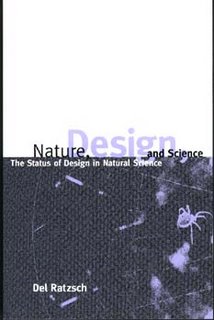Del Ratzsch is interviewed
here on science and design.
Below is a review I wrote for Science and Christian Belief
15 (1) (2003): 90-91 of Ratzsch's important book
Nature, Design and Science.
Del RatzschNature, Design and Science: The Status of Design in Natural ScienceState University of New York Press, 2001, 220 + x pp. pb. $18.95/ £10.50
ISBN 0-7914-4894-0.

Del Ratzsch will be familiar to most readers as the author of
The Battle of the Beginnings and the excellent introduction
Philosophy of Science, which has now been revised and updated as:
Science and its Limits. In fact
Nature, Design and Science (NDS) is a book length version of one of the chapters from Science and its Limits.
NDS deals, from a philosophical perspective, with the status of design in science: it seeks to examine the question of whether of not design is legitimate in scientific contexts. It comes in four parts. The first deals with ‘Design basics’. Here Ratzch takes care to define and distinguish between important concepts such as design, pattern, order, counterflow and artifacuality. At times I found this a little hard going, but the distinctions are important and crucial to the book’s argument.
With the preliminaries out of the way, Part II deals with ‘Supernatural design’. Here Ratzsch looks at possible ways of identifying design in nature; he concludes: ‘design explanations of structures and phenomena in nature
can be rationally legitimate’ (75).
The ‘Boundaries of scientific legitimacy’ come under scrutiny in part III. Here he ably undermines the notion that the empirical or what is ‘natural’ can provide a demarcation between legitimacy and illegitimacy in science.
In the final part ‘The permissibility question’ is examined. In Chapter 9 Ratzsch examines several reasons for adopting methodological naturalism, he finds them all wanting: ‘there are no completely compelling cases for an unnuanced policy of banning from science the ideas of design or of a supernatural activity in nature’ (127). Chapter 10 examines the ‘positive considerations in
favor of permitting [design and supernatural] concepts in science’; he finds that they ‘can in principle be of scientific, empirical, explanatory relevance’ (136). He also concludes that there are ‘at least some positive payoffs from permitting discussion of design in science’ (147). Not only is design legitimate, it is also useful.
There is an Appendix, which has a critical evaluation of William Dembski’s
The Design Inference. It also contains thirty-nine pages of notes, a seven- page bibliography and a five-page index .
Nature, Design and Science is an important book; it will need to be read by both proponents of, and objectors to, design in science. Proponents will find that it will help to refine their position; objectors will need to refute the arguments if the current methodological naturalism is to remain the consensus. Neutrals reading it will find it hard to remain neutral, as the arguments are persuasive!







